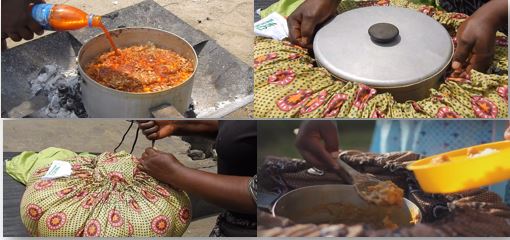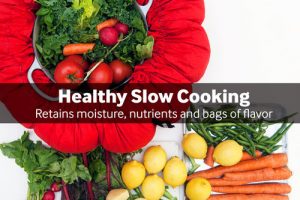A Wonderbag is a stand-alone, non-electric insulated bag designed to reduce the amount of fuel required in the cooking of food. Instead of being placed on a stove for the duration of the cooking period, food is instead heated to a hot enough temperature then transferred to the Wonderbag, which uses the principle of thermal insulation to continue cooking, and keeps food warm without needing additional fire or heat.
Working on the principle of thermal cooking, the Wonderbag is estimated to save up to 30% of the total fuel costs associated with cooking with Kerosene alone. In developing countries there are numerous advantages for the product, as it immediately helps ease deforestation of natural reserves, and it frees up those who would spend their time gathering the extra wood for fire fuel.
In conventional cooking, any heat applied to the pot after it reaches boiling point is merely replacing heat lost from exposure to the open air. What the Wonderbag does is to trap the heat within and consequently cook the content of the pot.
How It Works
- First, prep your dish. Do everything you would do before you would usually leave the dish to simmer. Then cover with a tight fitting lid.
- Then carefully place the pot inside the Wonderbag. Placing a folded dish towel in the base and around the sides of the pot can help keep your Wonderbag clean and adds a little extra insulation.
- Place the smaller cushion insert in on top of the lid. Then pull in the drawstring, enclosing the outer bag around it. Leave the bag somewhere safe where it will not be knocked or disturbed for the full cooking time. It may be hard but try to resist the urge to check on it during cooking time, as this will let out all the built up heat requiring you to put the dish back into the stove and bring it to the boil again before closing it up.
- When everything is cooked, remove the pot from the Wonderbag and serve. The cushion insert can be flipped over and used as a trivet to serve food from the hot pot. You would be surprised how hot the pot is even after several hours inside the Wonderbag.
Hailed as one of the greatest innovations of the 21st century by Kathy Calvin, President & CEO, United Nations Foundation, the Wonderbag addresses key societal issues and concerns especially in developing countries. It is completely energyless and in line with energy conservation campaigns.
Below are a few benefits of the Wonderbag.
Benefits
- Healthy: Cooking in the wonderbag keeps the moisture inside your food and nutrients do not boil away; promoting healthy food.
- Safe: Slow cooking in the wonderbag uses less water as there is no evaporation; eliminates the chance of food getting burnt and and frees you up for other chores or activities.
- Tasty and Delicious: Cooking in the wonderbag over time tenderizes meat, keeps vegetables firm, allows flavours to develop so meals are tasty and delicious.
- Portable and Convenient: The wonderbag is perfect for transporting meals to picnics and to friends – ready to share and eat – piping hot. It serves as an extra cooker and can be kept almost anywhere. Once it is used, it can be put away.
- Eco-Friendly: Due to the reduction in fuel used, the Wonderbag is estimated to reduce carbon dioxide emissions by up to half a ton per year if used three times a week.
- Versatile: The wonderbag is not just a slow cooker. It is a great yogurt maker, rice cooker and bread proofer. It can be used for a variety of things. The wonderbag keeps things cold too so it can be used to keep groceries cold and frozen while travelling.
- Aesthetics: Wonderbags are designed and made in attractive fabrics that are easy to wash, wipe and clean.
The Wonderbag was created to ease the impact of health, socioeconomic and environmental problems facing Africa and developing countries. The use of firewood and kerosene for cooking is prevalent in developing countries unlike in developed countries.
In Nigeria, for example, over 70 percent of households use firewood. According to the Nigerian Liquefied Petroleum Gas Association(NLPGA) about 30 million households and more than 100 million Nigerians depend on firewood as a source of energy for cooking.
As a direct consequence, firewood is primarily sourced from felled trees and this ultimately leads to deforestation by way of indiscriminate cutting of trees for use as firewood. Deforestation causes distortion or imbalance in the ecosystem and should be discouraged.
On the health-end of this sad practice,the smoke generated by firewood exposes humans to diseases such as tuberculosis and lung cancer especially women. Once they get sick, these impoverished people cannot afford treatment or medication.
A report on climate change says at least 150,000 Nigerians, men and women, die every year as a result of harmful smoke. Of this number, women represent the biggest chunk because in Nigeria, women are still exclusively saddled with the responsibility of cooking.
With little financial means, these women end up cutting trees to feed their families. Women with some means use kerosene, which also generates carbon monoxide. The use of Wonderbag aims to change this age-long negative trend and help women with better and healthier kitchen practices.
The Wonderbag empowers women across Africa to participate in more activities outside of the home; enhancing their quality of life. Children have more time to go to school.
Families remain healthier due to lower incidence of smoke inhalation related illness, reduced risk of burns and fewer acts of violence occur when collecting firewood. The Wonderbag, simply put, enhances rural women’s quality of life by drastically reducing time spent cooking.
The Wonderbag also has dramatic environmental effects in saving water, as cooking with a Wonderbag requires less water than in conventional cooking methods, reducing your carbon footprint and minimizing deforestation.
As of January 2013 over 650,000 Wonderbags have been distributed in South Africa, Rwanda, Kenya, and Syrian refugee camps in Jordan.
Wonderbags are also available in Nigeria, and can be obtained from the Friends of The Environment, Lagos office (in**@fo**.ng).


